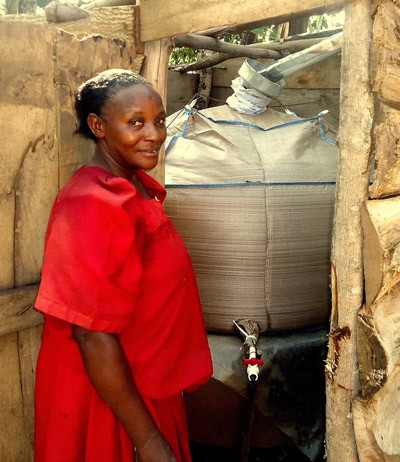Water and sanitation professionals work tirelessly to improve health, promote food security, and boost livelihoods. To further USAID’s knowledge sharing goals, the Water Office holds learning events that present solutions and challenges common to water programs. In Currents, we share the solutions discussed at the events and others. Email us at waterteam@usaid.gov if you would like your project to be considered for featuring in Global Waters.

Global Water Initiative Promotes Sustainable Watershed Management
In parts of Samé District in Tanzania, the rainy season can be brief, and the much-needed water it provides only available for a short time. The resource is so precious and the timing so difficult to predict that some women sleep with their feet in dry riverbeds to ensure that if water comes at night they won’t miss a single drop.
This district illustrates how variety in a watershed presents different management challenges for smallholder farmers based on their location upstream or downstream. Those at the top work to capture what water they can before it rushes (often with great force) downstream, where floods can be devastating. Competition for the limited resource at both ends and in the middle calls for strong management, particularly given the increasingly variable rainfall.
The Global Water Initiative (GWI), a partnership of international NGOs funded by the Howard G. Buffett Foundation, is working in Tanzania, Ethiopia, and Uganda to make water use for smallholder farmers more equitable and sustainable. A key aspect of their work is strengthening user participation, planning, and decision-making in water management. In Samé District, GWI has helped to establish a Learning and Practice Alliance with key government, community, research institutions, and non-government stakeholders to help explore, share, and scale up best practices in water management by working with select champion farmers, particularly women farmers. Building on principles of integrated water resources management (IWRM), the project uses a micro-watershed as a focal area and implements a series of action research activities on water management for smallholder farmers. Learning, including a better understanding of investment needs, will be shared widely at the district, national, and regional levels, helping to enhance farmer resilience and increase food security.
For more information on this project and other GWI projects highlighted during USAID’s June 28, 2013 learning event, visit USAID’s Water Learning and Sharing website.
World Vision Builds Behavior Change Framework
Behavior change is necessary for all other health- related interventions to succeed. While providing access to improved water and sanitation is important, it will not lead to improved health if people do not use the improved services or modify their hygiene behavior. However, behavior change programs present challenges, as they necessitate not just reaching people but ensuring that messages resonate with them enough to inspire sustainable, long-term change.
World Vision has experienced positive results through community-led total sanitation (CLTS), participatory hygiene and sanitation transformation initiatives, community health clubs, and school WASH clubs. Their experience shows that behavior change happens when there is a focus on interacting with the audience, instead of one-way communication. They stress that harmful hygiene behaviors persist not because of lack of awareness, but that other factors are at work, and knowledge is often not the controlling determinant. By learning what the barriers to behavior change are and comparing the perceptions of doers and non-doers, a framework can be designed to address perceived negative consequences and create bridges to these activities.
In Ethiopia, a World Vision WASH program using this type of framework led to a drop in open defecation from 69 to 44 percent between 2008 and 2010. Factors of success included participation in CLTS, household visits from a community outreach worker, and regular follow-up visits. Through these efforts, latrine ownership came to be viewed positively as contributing to the community’s health and development.
For more information on this project and other behavior change approaches highlighted during USAID’s June 27, 2013 learning event, visit USAID’s Water Learning and Sharing website.
Enterpriseworks Introduces Domestic Rainwater Harvesting Product
Projections show that by 2025, two thirds of the world’s population could be living in severe water stress conditions. The quest for water overtakes the lives of millions. In the developing world, on average, women walk six kilometers each day to collect water – a daily total of 200 million hours or 293 lifetimes. Given the growing scarcity of water, the USAID Water and Development Strategy promotes innovative water harvesting possibilities. EnterpriseWorks, a division of U.S. nonprofit Relief International, is introducing one such product, a device called bob® the rainwater bag.
The bob® is a portable rainwater storage bag that enables the collection and use of rainwater at the household level. Domestic rainwater harvesting has been practiced for thousands of years but is under-utilized because current water storage technologies are expensive and difficult to move. EnterpriseWorks developed and field-tested bob® to address these shortcomings. The rainwater bag costs less than half of what other domestic rainwater harvesting products cost and has a storage capacity of 1,400 liters, but comes in a compact 20-liter package. If successful, bob® has the potential to help millions of people in the developing world access safe water in their own homes and make the most of erratic rainfall.
EnterpriseWorks is marketing bob® with wall paintings, radio and TV messages, posters, and billboards through a commercial pilot project in Uganda, where over 2,800 units have been sold. They are testing bob® in more than 10 countries with local partners and have plans to scale up if the Uganda pilot project proves successful.
For more information on this project, visit bob® on Facebook and YouTube.







Comment
Make a general inquiry or suggest an improvement.